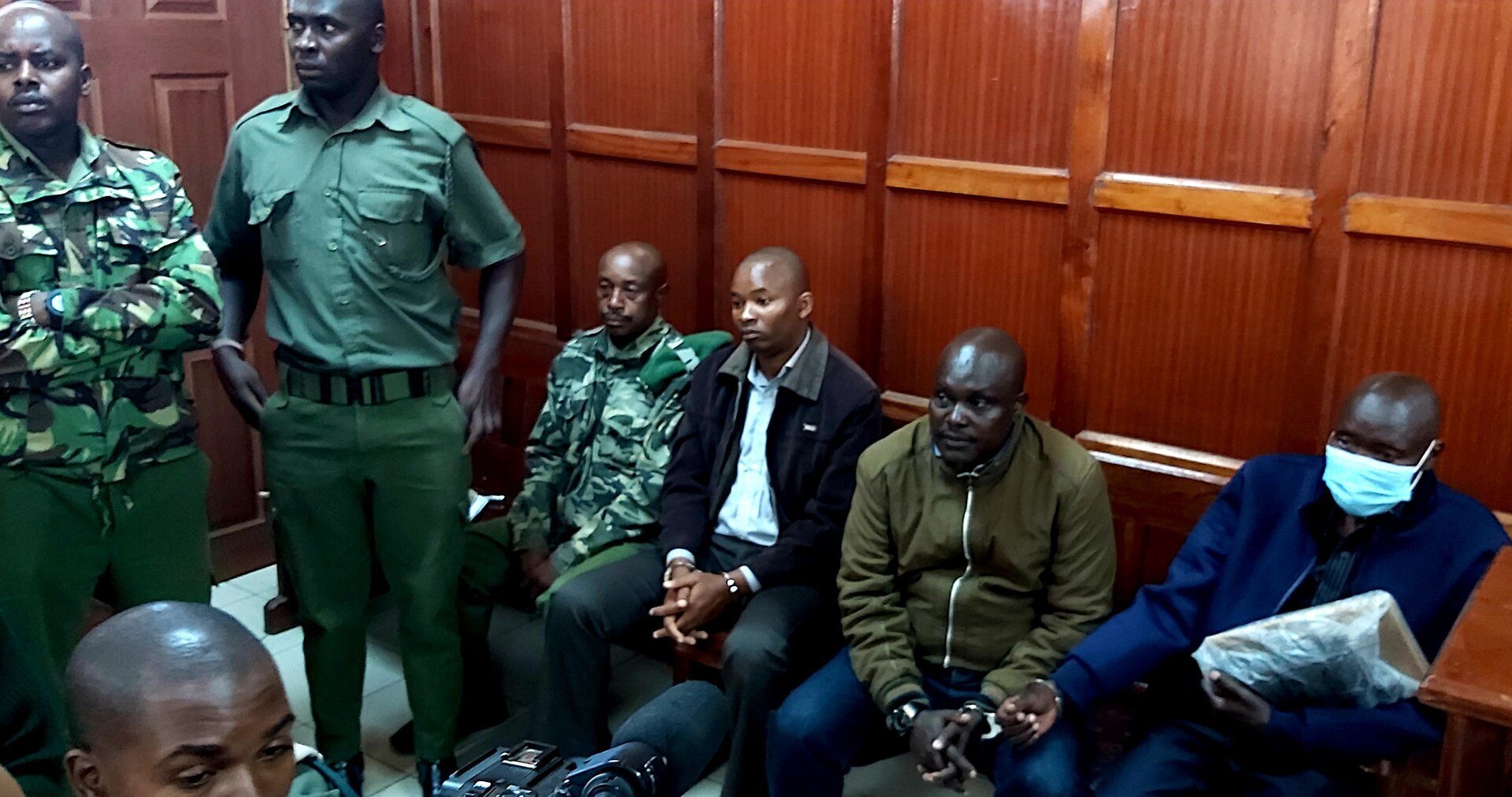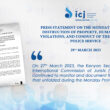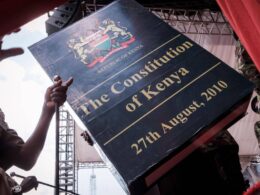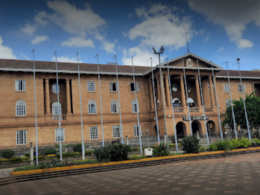Outside the Milimani Law Courts, temperatures hardly rose above 18 degrees Celsius but inside the Constitutional and Human Rights Division Fourth Floor, where the sentencing was awaiting to be delivered in the high-profile case of International Justice Mission (IJM) lawyer Willie Kimani, his client Josephat Mwenda, and their cab driver Joseph Muiruri, it was a furnace of mixed emotions.
There was a sigh and unbelief that Justice would finally be served after a long wait, with the case being in Court for over seven years with 185 court appearances. The tension in the room converted the cold air to hot and stiff, with sweat dripping on some of the faces of those awaiting the Judgement. A phalanx of cameras and microphones crowd the courtroom as the people patiently await the sentencing of the three police officers and a civilian found guilty and convicted of killing Kimani, Mwenda, and Muiruri.
The Prosecution had presented 46 prosecution witnesses; there were 14 defence witnesses, including the five Accused persons and 117 exhibits in the trial. The exhibits included phone data records, mobile phone companies’ cell site analysis and DNA samples of the accused persons. The Accused also had a chance to present their mitigation pleas through their lawyers, Cliff Ombeta, Katwa Kigen, Mochere and Kevin Michuki.
After waiting two hours, Justice Jessie Lessit came in and wished everyone a Happy New Year, 2023. The court clerk called out the case, and Justice Lessit asked the Accused to stand up as she read a summary of the ruling and said the full ruling would be availed later.
“I have carefully considered the mitigation of each Accused person as given orally and in writing. I have also considered the various reports that were filed: the probation report, the medical report, the victim impact report, and certificates of the various courses undertaken by the Accused persons during their incarceration. I have also considered the circumstances of this case, the meticulous planning, implementation and brutal execution of the deceased. To say the least, this was a murder most foul and execution that was most heinous,” said Justice Jessie Lessit.
“I find that the most suitable sentence for each of the Accused persons is as follows: The 1st accused, [Fredrick Leliman], is sentenced to death in each of the three counts with the prison terms running concurrently; the second Accused [Stephen Cheburet] is sentenced to 30 years imprisonment in each of the three counts with the prison terms running concurrently, third Accused [Sylvia Wanjiku] is sentenced to 24 years imprisonment with the prison terms running concurrently and Fifth Accused, police informer [Peter Ngugi] is sentenced to 20 years with the prison terms running concurrently,” she added.
During the court proceedings, Josephat Mwenda’s wife, consumed by grief, passed out and fell off her chair, and other court attendees rushed to rescue her. She was later resuscitated, but as she tried to respond to the media seeking her reaction to the sentencing, she introduced herself as tears rolled down and passed out again.
Speaking to the media outside Milimani Law Courts immediately after the Judgement, Willie Kimani’s wife, Hannah Wanjiku, said that despite many years and several delays, she believed Justice would be served. When questioned about the children, she said, “The children are in school, and the firstborn is already in Grade Five while the younger kid is in Grade Two. Castrol has memories of his dad, but the second-born has no recollection of his father because he was just nine months old in 2016… I will try to explain to them in a language they can best understand.”
The disappearance and death of Willie Kimani, Josephat Mwenda and Joseph Muiruri sparked a global outcry for Justice for their families and seeking to hold to account those responsible for their deaths. Despite being a high-profile case with numerous media coverage, the case dragged into Court for seven years. However, in a positive light, the case gave hope to families that have lost their loved ones in the hands of police officers and survivors of police abuse that Justice would one day be served.
Justice Lessit’s reasoning behind the sentencing
First Accused
From the circumstances of the case, the following are the aggravating circumstances of factors: One the murder was intended to interfere with the cause of Justice, two the offence was committed by a group, three the deceased were kept inside the boot of a car and taken out one at a time to be murdered. The murder was executed close by so the victims could hear the thumping and blows being inflicted and their colleagues’ screams, shouts and groans as he was killed.
The fact that each knew they would be the next to face fate must have cost them extreme fear, stress and psychological torture to the victims as they waited for their turn. Four, a crude weapon was used to batter the victims to create excruciating pain to the victims. Five, the deceased were put in gunny bags and plastic bags and dumped into Athi River, intending to conceal the murders and make the recovery of their bodies difficult. Six, the murder involved flagrant and excessive use of violence against the deceased and caused damage to the persons. Seven, while clearly, he had a grudge against the deceased Mwenda, he captured and killed the deceased Kimani and Muiruri, not caring about their lives and the fact that they had not done anything to him to deserve what he did to them. They were collateral damage, and I must add that not that Mwenda deserved the judgment he received from them either. The first Accused, a police officer who had been employed and paid a salary with public funds to protect life and preserve property, acted in flagrant abuse of his office and contrary to the duties he was employed to perform. The offence involved detention and inhumane treatment of the deceased persons.
On the issue of culpability, the Accused shot Mwenda one year before the incident, which is the subject matter of this case. Even though the injury was very severe, being a gunshot wound that involved the hand and upper chest, the first Accused, after taking him to a clinic for first aid, took him to Mavoko police station, where he locked him up in the cell for three days before charging in Mavoko Law Courts with several criminal charges. That was the beginning of a prolonged and sustained harassment against the deceased Mwenda until, for sheer fear of his life, he approached the International Justice Mission (IJM) and Independent Police Oversight Authority (IPOA) for help. IJM gave him a lawyer, Willie Kimani, to represent him in Court and another lawyer to act as his bodyguard, and every time they went to Court, a taxi to ferry him to Court.
Second Accused
According to the ruling, Stephen Cheburetstood by his colleague, Leliman and stuck with him on every step on the material day. He did not have any personal vendetta against any of the deceased. However, he played the critical role of abducting and holding the deceased at his police post, where he was the senior officer in charge of duty.
Third Accused
For the third accused, her role was to keep the deceased persons at the police post, where she was the reporting officer all the way until the time the deceased persons were removed from the post and taken away to be murdered.
“I have been asked to consider that she was the youngest and the most junior in the group, and even though not requested, I have also considered that she was the only lady in the group. Being a police officer with a firm, stringent pecking order system and being junior has significance in need for discipline and order in the force; that discipline and order cannot include aiding, abetting and enabling crime and eventually concealing and denying any knowledge or involvement in it. Had she been candid at any stage of the investigation or the trial, it could have been a factor that could have served as a positive extenuating circumstance in the mitigation,” said Judge Lessit.
“I also noted that even in the mitigation by her counsel on her behalf, she denies playing any role in the matter. However, to her credit, she was candid to the probation officer and admitted negligence in her place of work on the material day, which was facilitative. She played a not peripheral role, as [his lawyer] Mr Kigen suggested,” she added.
Fifth Accused
According to the ruling made by Justice Lessit, the fifth accused, Peter Ngugi, confessed to the police, which she believes helped immensely in the investigation.
“It was his confession that shaped the investigation. His defence under oath was further confessed to his role in the murder. I noted the variations in his confession to the police and his confessions in his defence. He did not colour anything white that was black,” said Judge Lessit.
What is the legal implication?
Section 203 of the Penal Code state, “Any person who of malice aforethought causes the death of another person by an unlawful act or omission is guilty of murder, whereas Section 204 of the Penal Code provides that “Any person who is convicted of murder shall be sentenced to death.”
In rendering her sentence, Justice Jessie Lessit referred to the Sentencing Guidelines revised and adopted by the National Council on the Administration of Justice (NCAJ), “The following guidelines are applicable in a rehearing sentence of a murder charge: age, being a first offender, whether they pleaded guilty, character and record of the offender, omission of offence in response to gender-based violence, remorsefulness, the possibility of reform and re-adaptation of the offender and any factor that the Court considers relevant. We wish to make clear these guidelines in no way replace judicial discretion. They are advisory and not mandatory. They adhere to promote transparency and consistency in sentencing hearings. They also aim at enabling public understanding of the sentencing process….”
In respect of the first Accused, the evidence before this Court proves that the murder of the deceased was premeditated and had been hatched by the first Accused, who was the master planner, several days before the execution of the plot. The conspiracy involved high-level planning and organisation meticulously carried out, sophistication, and the use of technology with mobile phones and police radios. On the material morning, victims’ movements were monitored in and around the courtroom at Mavoko law courts. Eventually, they were traced, abducted and ferried in the abductor’s vehicle, a private car, to a container at Syokimau AP Post. They were locked up from midday until nightfall without food or water.
Judgement on the Conviction of the three police officers and an informer
In a four-hour judgement delivered on Friday, 22 July 2022, Judge Jessie Lessit found three police officers: Sergeant Frederick Leliman, Stephen Cheburet and Sylvia Njoki, and a police informer, Peter Ngugi, guilty of murdering lawyer Willie Kimani, Joseph Muiruri and Josephat Mwenda on 23 June 2016. Police officer Leonard Mwangi was acquitted on all three counts of murder. The four accused had 14 days since the Judgement was delivered to appeal the case.
“I am satisfied that the Prosecution has proved the case against the 1st, 2nd, 3rd and 5th accused beyond any reasonable doubt. I find the 1st, 2nd, 3rd, and 5th accused guilty of the three counts of murder contrary to section 203 of the Penal Code. Accordingly, I reject their defences, find them guilty as charged and convict them accordingly under Section 322 of the Criminal Procedure Code,” said Judge Jessie Lesiit in her Judgement.
As the High Court Judge Justice Lessit began reading out the Judgement, one of the Accused police officers, Leonard Mwangi, who was dressed in a striped shirt, a navy-blue blazer, a black mask, with handcuffs on one of his hands and holding a maroon notebook with the year 2019 with both of his hands, bowed his head as if hoping for saving as he waited for his fate.
Due to public demand on the outcome of the trial, the Court moved the proceedings from Milimani Law Courts Constitutional and Human Rights Division Third Floor Courtroom 1 to the ceremonial hall to accommodate human rights defenders, both national and foreign lawyers and journalists, and interested members of the public from across the world.
The Judgement came a month after the sixth anniversary of the disappearance and murder of lawyer Willie Kimani, his client Josephat Mwenda, and taxi driver Joseph Muiruri. Despite much media coverage, the case’s progress has been slow, with 100 adjournments. The adjournments breed uncertainties about the outcome of the trial.
Judge Lessit took over the case on 14 February 2017 from Judge Ruth Sitati, who had heard two witnesses.
The lead Prosecution Counsel in the case was Mr Nicholas Mutuku, and Ms Mbula Rubia assisted him; Cliff Ombeta was the lawyer for Fredrick Ole Leliman and Stephen Cheburet Morogo [1st and 2nd accused]; Mr Katwa Kigen was the lawyer of Silvia Wanjiku Wanjohi [3rd accused]; Mr Mochere represented Leonard Maina Mwangi [4th accused], and Mr Kevin Michuki was the lawyer to Peter Ngugi Kamau and took up his case after the evidence of PW38. Senior Counsel Dr Fred Ojiambo represented the victims in the case; the Law Society of Kenya was represented by Prof. Ben Sihanya and Mr Stephen Ongaro, and Ms Muchemi watched the brief for International Justice Mission (IJM).
**End**











